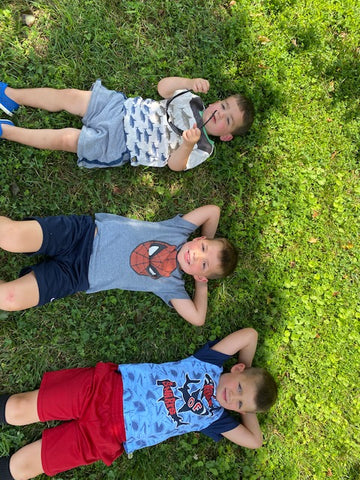By Alexandra Frost
When the world locked down for the pandemic, my husband and I looked at each other in terror--not just about COVID, but about what exactly we were going to do with our three wild animal sons under age 5, under one roof, in the crisp and chilly days of early spring. After the first stressful weeks of kids shouting in the background of Zoom calls, we figured out our secret to reconnecting was sitting in the driveway. We’d purchased a camper just months before, and didn’t realize how essential it would be to our family’s mental well-being during one of the most trying times of our lives.
Camping became a hot trend during the pandemic, as cooped up Americans realized it was one of the most socially-distanced “vacations” they could do. Campers started to sell out, and others who tried to buy new campers after us had month-long waiting lists. Campgrounds started to book out months in advance where they’d been available days before in the past. Americans were seeking solace right outside their towns, as one of their only options.
We’d camped before, in a smaller hand me down camper that had fallen apart just a few months into our new hobby. So, we’d thrown some money where our mouths were and decided this would be the year our family would connect in the outdoors, and build memories for our sons who were dying to get out of suburbia and into simple pleasures like nearby creeks, lakes, forests, and adventures.
We weren’t looking to camp very far away. We had a colicky baby who couldn’t stand more than 20 minutes in the car without making it well known that he was done. So, we did some out of the box thinking, and planned weekend trips every other week for the next six months, all within just an hour of our hometown. We realized quickly we didn’t need to go far to detach from technology, mind-numbing Zoom calls, and the claustrophobic nature of having all of us under one roof every day.

Within minutes of arriving at any campsite, my sons instantly play more peacefully together. The first trips consisted of them looking for clues for buried treasure--each campsite number and water pipe marking was part of a greater map they’d decided all campgrounds use to help kids find the treasure. They thought of all of this on their own, and to this day while we camp they’ll still run ahead on a walk, scour the ground, and decide a rock or marking is “evidence.” They’ve never found the treasure, but we realize (and they someday will) that the time outside, together, is the treasure.
There were more trials and treasures to be found camping together: the predictable marriage spats all campers find themselves in as they try to help each other back up the camper into a tiny lot. The opportunity to sit under the expanse of stars once the kids were all finally asleep in the camper (or at least slyly messing around, jumping on each others’ bunk beds). Our friends looked at us quizically when they learned about our pandemic camping hobby--how does leaving your house to set up another mini-house and sit around sound appealing? The answer was, it simplifies everything. We didn’t look at our phones the entire weekend (not that there was reception anyway). We had no purpose for TVs, iPads, computers, or video games because our kids were so busy tromping around the creek debating how many leaves a poison ivy plant has and how many sets of skin snakes shed in their lifetimes. None of us could look up the answers if we wanted to, and that made it better.
Thanks to the pandemic forcing us together, and outside, we know we will be lifelong campers, and our sons will grow up with fond memories of weekends outside together. It saved our sanity short term, and will unite our family long term.
